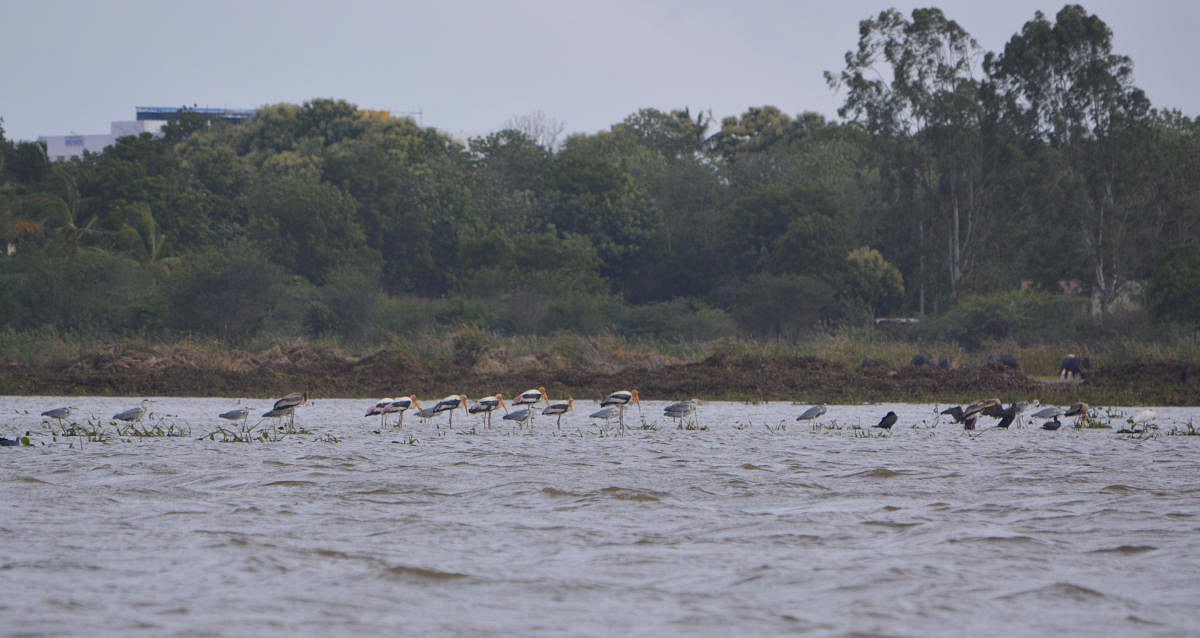Lake in recovery

Right in the middle of the 200-plus acres of Unkal Lake, the statue of Swami Vivekananda silently witnesses the waterbody, a hallmark of Hubballi, turn lifeless.
Not so long ago, the water from Unkal Lake was used to feed the entire city. But today, the lake is barely able to sustain life within it, though rejuvenation efforts by a few individuals, NGOs and the civic body are on.
According to Kannada professor
N C Patil, a resident of Unkal village, it was in the 11th century that the lake’s existence was recorded.
Inscriptions revealed that the lake was a cradle of Shaiva culture, literature and tradition. The word ‘unkal’ is a rough derivation from two words: unisu (to feed) and kallu (stone) in Kannada.
Unkal Lake draws its name from two anecdotes.
Jakanacharya, a famed sculptor, while constructing Chandramouleshwar Temple on the lake banks, followed the system of cooking and eating food before dawn.
Once, when he was about to eat, he heard a caw from a cock, except he didn’t realise it was an old woman’s call. Irked by this, he dug a pit, poured food into it and uttered ‘unnale kallu’, which later became Unkal.
It’s said that Shiva Sharana Channabasavanna was on a pilgrimage to Ulavi when the calm waters of the lake drew his attention. He conducted lingarchane, went to a nearby Shiva temple, and offered food to the linga; in other words, ‘Kallu Unisu’ (feeding a stone).
The lake and its surrounding have served as the karmabhoomi (place of work) of the popular saint Siddeshwar Swamiji (or Siddappajja).
New life
In 1893, the ancient lake was rejuvenated under the guidance of Sir M Visvesvaraya to supply drinking water to Hubballi. It’s said, in 1912, around 4.5 million litres went to Hubballi.
The villagers recall that the lake not only attracted pilgrims, but was also a source of income to 400 fisherman families. But today, its water is not potable and sustains only a handful of fisher folk.
Urbanisation close to the lake’s catchment area in 1990s contaminated its water, and the water supply to Hubballi discontinued after 1995.
“Land encroachment and garbage dumping was another challenge. Water was used only for washing cattle. Water hyacinth, an exotic aquatic weed, polluted the lake and affected its biodiversity. Eradication of this plant became tough due to its longevity,” said Dheeraj Veeranagoudar, Council of Scientific & Industrial Research Pool Officer at Karnatak University.
The lake’s sorry state sounded an alarm and activists began working towards its revival. As a result, the district administration developed the lakefront and introduced boating. However, boating did not work out. Later, the lake was de-weeded thanks to a private organisation. But, due to the high biomass content, the weed was back. Now, fresh conservation efforts have begun through the release of third-level treated water into the lake to curb the growth of water hyacinth. While the water isn’t potable, it can sustain aquatic and avian lives, and promote tourism. Four sewage treatment plants (STP) have been planned to prevent the release of effluents into the lake.
Eco-support
According to zoologist Harshvardhan Jamkhandi, the lake’s wetland supports 175 bird species like ducks, geese, waders, flycatchers, warblers and raptors. The lake also hosts great bittern, osprey, oriental darter and white-bellied sea eagle. The region has 40 species of butterflies and moths, 20 species of dragonflies and damselflies, turtles, and mammals such as Indian hare and jackal. The lakefront is a preferred spot for morning walkers and joggers, and draws crowds during festivals.
Environmentalist N V Nitali says lake rejuvenation is not difficult if people realise its importance and local authorities extend co-operation.
Now, who’s listening?
Deccan Herald is on WhatsApp Channels| Join now for Breaking News & Editor's Picks